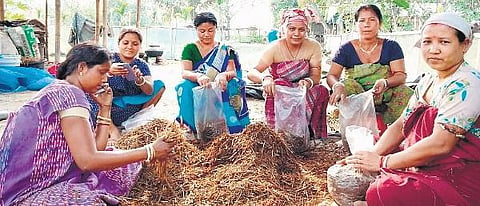

If you are travelling to or from Northeast, make sure to choose a train that halts at Assam’s Kokrajhar. An outlet here will give you an unusual taste of organic mushroom. It deals entirely in the fungi – fresh, dried and powdered and the derivatives pickle, biscuit, soup, “bhujia”, “khurma”, “pakoda” etc. Launched in May, this is India’s only “all-mushroom” stall at any railway platform.
Amrit Debnath, a young graduate, runs it under the brand name of “AxomBazar”. He is a “soldier” of a mushroom movement that is sweeping the once insurgency-ravaged Kokrajhar district, which is bound by Bhutan on the north and West Bengal on the west.
Some 5,000 farmers, over 500 self-help groups and 150 MSMEs have taken the Mushroom Mission of the autonomous Bodoland Territorial Council (BTC) to the level of a movement. The authorities identified mushrooms as a product under the Centre’s ‘One District One Product’ (ODOP) initiative.
Debnath’s AxomBazar was launched in 2020 and it exported its maiden consignment to Bhutan in May this year. Hiren Roy, a progressive farmer, had supplied the fresh mushroom to Axombazar.
Debnath was allocated the stall under ‘One Station One Product’. He facilitates the sale of mushroom products of farmers in Kokrajhar. People from mainland India place orders on AxomBazar’s online platform.
The BTC administers five districts of western Assam. All departments are working in tandem to achieve the goal of making Bodoland the country’s mushroom hub.
The Bodoland Farmer Producer Company (FPC) Ltd, set up in the non-descript Rajendrapur village on October 10 last year, is spearheading the movement. It specialises in mushroom and its derivatives. Altogether 526 farmers – 98% of them women – from 26 villages have helped the Bodoland FPC make a steady growth. The farmers, who are from 26 farmers’ interest groups, produced 26,000 kg of mushroom in just five months.
Paritran Narzary, chairman of Bodoland FPC, believes mushroom can help ensure a turnaround in Bodoland’s economy. “We are in the early days of the movement. Mushroom holds great prospects for Bodoland’s economy if there are proper market linkages,” Narzary says.
The farmers need 23 days to produce mushroom and each cylinder gives multiple harvests with an investment of just Rs 35 to get returns upto Rs 400. The low cost is driving many women to mushroom cultivation.
ASSAM: “It is difficult to get a good harvest during the summer and monsoon months, yet we can upscale our production if we get a favourable condition,” Albina Basumatary says confidently as fellow farmers Bidya Paudyal and Basanti Hembrom nod their heads in agreement.
The craze for mushrooms is such that several schools have started producing them after the students underwent training.
District Magistrate Varnali Deka said the very first hurdle in Kokrajhar’s journey was that it had no ODOP. She said although mushroom consumption is very common in tribal societies, there was a lack of know-how. She said the decision to select mushrooms was based on a number of factors.
“The agro-climatic condition of the district is extremely favourable for mushroom production. With the depletion of land and other resources, along with the growth of population, there is a proportionately increasing need for food and nutrition. Again, Assam and Kokrajhar are hugely agrarian, management of agro-waste is a huge area of concern. Mushroom cultivation is an answer to these – it is a low-cost health food and the highest producer of protein per unit area and time,” Deka says.
The administration fell for mushrooms as an option for livelihood and entrepreneurship, for its cultivation is not contingent on land availability. Also, it has minimal resource requirement, very low capital investment, low water requirement, wide availability of organic agro-waste, presence of potential domestic and international markets, high consumptive, non-consumptive, nutraceutical values and value-added products.
“Kokrajhar has a population of tribal, backward groups and minorities that lags in most developmental parameters. Low income and poverty are a cause of concern. Participation of women in the workforce is also below average. Against this backdrop, mushroom as ODOP has become the answer to better livelihood and income generation opportunities,” Deka says.
Kokrajhar traditionally has had high rates of undernutrition, malnourishment, anaemia and IMR/MMR. So, it was decided to use mushrooms as a tool to solve the challenge of malnutrition.
“Mushroom supplement was introduced in schools and AWCs under Mid-day Meal programme. Poshan Clubs were engaged in generating awareness on the nutritional benefits of mushrooms,” she adds.
The Department of Biotechnology, Bodoland University is playing a stellar role in the mushroom movement by producing spawn at its Technology Incubation Centre (TIC) and imparting training to individuals.
“The present giant movement of mushroom production and designating it as an ideal tool for the rural economy was initiated from a spark in the form of a practical of Single Cell Protein for M.Sc biotechnology students in 2012,” Prof Sandeep Das of Biotechnology under Faculty of Science and Technology, Bodoland University, says.
Since then, the team started the back-end process of producing spawn for rural entrepreneurs. Initially, the movement started as ‘Earn while you learn’ for student entrepreneurs but with time and through extramural projects, it covered rural and marginalized entrepreneurs.
The TIC is the one-stop solution to spawn production, valorization, imparting training on 23 mushroom species including cordyceps, reishi, shiitake, enoki, lion’s mane etc and development of an integrated zero waste management model for an augmenting circular economy.
The TIC plays an important role in designing models for government-aided mushroom missions and market linkages for farmers. To date, it has trained 8,500 mushroom farmers across the Northeast. In 2020, it launched the eMarketing portal ‘AxomBazar.com’ as a start-up. The Centre has a 24X7 mushroom helpline number 9101952358.